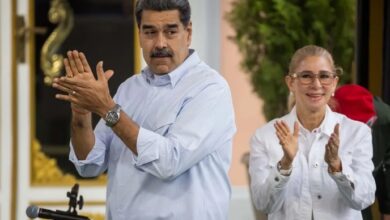Venezuela: Is Hezbollah in Latin America?
According to the US secretary of state, the Islamic terrorist group has a presence in the Caribbean country.

Hezbollah supporters participate in a demonstration to commemorate al-Quds day in Beirut, Lebanon. / Photo: AP / Hassan Ammar – Reference Image
LatinAmerican Post | Iván Parada Hernández
Listen to this article
Leer en español: Venezuela: ¿Está Hezbolá en América Latina?
During the III Hemispheric Ministerial Conference to Fight Terrorism, the Secretary of State of the United States, Mike Pompeo, said that, among some of the threats facing American countries, the terrorist group, Hezbollah, would be one of them. Is this credible? To answer this question, it is necessary to contextualize what Hezbollah is, what its objective is and if it is a real threat to the United States or regional security.
Context
Hezbollah is a Shiite political and armed group considered a terrorist group that has been operating in Lebanon since the late 1980s. It was formed during two conflicts such as the Lebanese Civil War (1975 – 1990) and the Lebanon War (1982) that are closely related to the Arab-Israeli conflict.
Its main objective, at least historically speaking, is the elimination of Israeli influence and Western powers, in addition to the establishment of an Islamic republic in Lebanon, which has a considerable population of Christians.
During the Cold War and after the displacement of thousands of Palestinian refugees to Lebanon because of the successive conflicts and occupations in Israel, the demographic balance of this country opted for the incipient Muslim population, counterbalancing the Christian majority.
Also read: How is corruption perceived in Latin America?
Hezbollah was born in that context, trying to take the status quo of Lebanon in a region with deep ethnic and religious ruptures. In fact, it is affiliated with Shiism in Islam, the second largest group in that religion after Sunnism. The difference between the two groups is that the former consider Muhammad's successors to be his direct family, while the latter consider that the heirs of the Prophet's message can only be members of the tribe of the latter: the Quraish.
However, according to the new manifesto of the political branch, written in 2009, the group now seeks a secular state without ethnic or denominational preferences, in addition to other progressive and even liberal social policies. There is no major change in front of their position against Israel and the United States, who remain their main enemies.
Presence in Venezuela
Why, then, would this group be interested in making a presence in South America? Is Nicolás Maduro, who knows with what money, sponsoring a Lebanese armed group with limited interest in Latin America? There are voices that defend that there are destabilization interests behind this supposed presence.
The Center for a Free and Safe Society (CSLS), an NGO that studies terrorism and leftist regimes, maintains that countries like Iran are interested in destroying the influence of the United States in Latin America.
If Maduro allows Hezbollah and other armed groups to take refuge in his country, Joseph Humire, part of the CSLS, believes that the financing of these would be given by foreign aid from sympathetic governments, such as Russia, Iran, and China. Are these arguments sufficient to believe that Hezbollah is active in the region?
Read also: Guatemala breaks relations with Venezuela
The financing of the Iranian government to this armed group and the mutual involvement in the attack on the Judeo-Argentine community (car bomb of the AMIA in 1994) is known and it is clear that the CSLS sees this event as an example of the group's claims in America Latin On the other hand, some assumptions of the attack suggest that it was a retaliation of Iran to Argentina for refusing to sell them nuclear technology.
Apart from this attack, two others have been attributed to Hezbollah. These were the attack on the Israeli embassy in Buenos Aires in 1992 and two panfletary bombs that did not explode in front of the US embassy in Caracas in 2006.
For almost 30 years of "activity," Hezbollah does not seem to be an active threat but a latent one. It is still missing because evidence is presented of its presence in Venezuela and what is its potential risk to the region.




